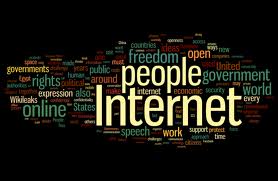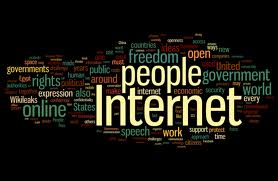What is a discussion on democracy doing on a blog site devoted to looking at technology and scientific advancements in the 21st century?
The reason – simple. The great technological innovations of the latter part of the 20th century are altering the dynamic of communication across the world today. I’m talking about the Internet and the spread of wireless networks. Both have created positive and negative change. Both have been disruptive.
The Internet and its Impact
With 2.8 billion people connected to the Internet and more than a billion more expected to be added by 2015 the influence of the Internet cannot be underestimated. Probably one of the best recent examples of how disruptively impactful Internet access has become is “The Arab Spring.” The Internet has acted as an enabler of communication. The Internet has become a knowledge sharing source. The Internet has crossed language, ethnic, religious and ideological boundaries.
Marketers today recognize the power of the social aspects of the Internet by developing “cause” and “event” strategies to attract customers. Religious groups are using it to spread their credo. Political parties are using it to build war chests and to run campaigns. And people who believe in a cause are establishing extra-national movements to address important issues such as inequality, the environment, climate change, education and economic security.
Wireless Networking and its Impact
Wireless networks have grown hand in hand with the Internet. Nations of the Developing World in Asia, Latin America and Africa have skipped an entire generation of infrastructure to become interconnected through the building of cellular networks. The arrival of smartphones and tablets has made computing mobile. And applications in the cloud now can come directly to a mobile phone almost anywhere on the planet. This revolution in communication has made Internet access ubiquitous.
Democracy and Technology in the 21st Century
The Millennium Project is focused on the future and at its site it identifies 15 global challenges. Number #4 is “How can genuine democracy emerge from authoritarian regimes?” The answer appears to be fueled by the Internet’s capability of disseminating knowledge, providing exposure to new ideas, encouraging transparency in government, exposing political corruption and election fraud, and facilitating communication through words and pictures in such a way as to break down walls and barriers to equality.
So are nation states moving closer to mass democracy today because of the Internet and wireless network communication or in spite of these technologies? The evidence seems to suggest that both are primary enablers of democratic calls to action within nations that are currently ruled by oligarchies or dictators. And the enabling is happening particularly with the young, an increasingly educated population, which finds that it can organize using smartphones and mobile networks. Young people express common ideals quite independent of the institutions that govern them and regardless of national or ethnic identity.
Again The Arab Spring presents a good example of just how disruptive and democratizing these technologies are not just within a single country but across an entire region connected by religion and language. With 60% of the population of Egypt, Tunisia, Libya and Syria, under the age of 30, and with unparalleled access to social media through mobile phone networks, two of the region’s countries have experienced relatively benign revolutions in which the sitting dictatorships were overthrown. And in the remaining two the reaction to a call for more democracy has led to repression and a reaction in the form of civil disobedience, rebellion and civil war.
Other examples include the 37 members of the African Union who signed a Charter on Democracy, Elections and Governance in 2007. Among the priorities they identified included improvements to education and Internet access, both seen as instrumental for democratic reform and economic growth. Similarly there have been democratic movements in countries in South Asia, (Thailand and Myanmar are two examples). Oceania and Latin America are seeing large growth in the number of Internet and social networking users. This growing connectivity will no doubt lead to disruption and may yield more democratic states as a result. Even in China, the last large bastion of Communist rule, the Internet and wireless networks are altering communication and introducing levels of dissent previously unheard of.
Dogma and the Dark Side in the 21st Century
Today half of the planet is peaceful and the other half vulnerable to social instability and violence. Why? Because in many nations there are outdated forms of government, social castes that are entrenched with little opportunity for those on the bottom to be successful, legal systems that are antiquated or based on religious observance that is outdated, rising food prices, scarcity of clean water, inadequate health services, and a lack of energy. In addition the threat of climate change and rising sea levels is impacting the poorest countries causing increasing migration and worsening environmental conditions. According to the United Nations, 40% of all conflicts in the past 60 years have been triggered by the scarcity of resources.
The “have not” part of our world desperately wants what the “haves” possess. But they don’t necessarily want everything because so many are locked into political or religious dogma that rejects much of what has gone along with technological progress on the planet. Tribalism and religion can be a deadly mix. So can nationalism and political ideology. And all can find a comfortable home on the Internet on which their dogmas can be made available to the millions who are now wirelessly connected.
As the Internet and wireless technology have spread there appears to have been a decline in conflicts. The United Nations provides evidence that cross-cultural and intra-state conflicts are turning into conversations and settlements. In 2011 there were 10 wars or conflicts leading to 1,000 deaths per year. That was down from 14 in 2010.
Today cyberwarfare and robotic drones are replacing conventional battles fought between well-armed military forces. Nuclear armaments although dramatically decreased in number may soon be acquired by states like Iran, a country that exhibits some of the dogmatic behaviours previously described. But even Iran has been touched by the unrest of rising expectations within its youth fueled by the Internet and wireless technology.

















